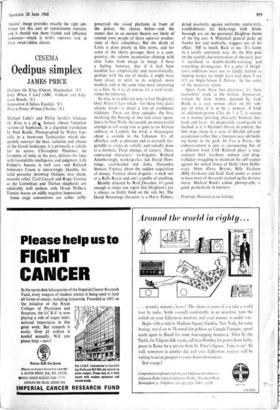CINEMA
Oedipus simplex
JAMES PRICE
Oedipus the King (Odeon, Haymarket. 'A') Only When• I Larf (ABC, Fulham and Edg- ware Roads, 'A')
Separation (Chelsea Essoldo, 'X') Two a Penny (Prince Charles, 'A')
Michael Luke's and Philip Saville's Oedipus the King is a plri honest, almost Victorian version of Sophocles, in a dignified translation by Paul Roche. Photographed by Walter Las- sally in a burnt-out Technicolor which elo- quently conveys the heat, isolation and silence of the Greek landscape, it is primarily a vehicle for its actors. Christopher Plummer, no favourite of mine in the past, delivers his lines with formidable intelligence and judgment. LiIli Palmer's Jocasta is well cast, and Richard Johnson's Creon is interestingly likeable, his solid presence throwing Oedipus into sharp, neurotic relief. Cyril Cusack and Roger Livesey as the Corinthian and Theban shepherds are admirably well spoken; only Orson WeIles's Tiresias leaves an oddly negative impression.
Some stage conventions are rather stiffly
preserved—the raised platform in front of the palace, the chorus below—and the scenes shot in an ancient theatre are likely to' remind some people of those open-air produc- tioni of their schooldays. But the death of Laius is done purely in film terms, and for some of the choric passages there is a com- promise, the solemn incantation chiming with slow fades from image to image. I have a feeling, however, that if it had been handled less simplistically and naturalistically, perhaps with the use of masks, it might have been closer in spirit to its original, more modern, and at the same time more interesting as a film. As it is, of course, it's a total irrele- vance for cineastes.
So also, in its different way, is Len Deighton's Only When I Lan which--for those who don't already know—is about a trio of confidence tricksters. There are three episodes, the first, involving the fleecing of two real estate specu- lators in New York; the second, an unsuccessful attempt to sell scrap iron as guns to an African embassy in London; the third, a shenanigans about a swindle in the Lebanon. It's all effortless stuff, as pleasant and as instantly for- gettable as crepes de volaille, and nakedly done to a formula. Three changes of scenery. Three contrasted characters: ex-brigadier Richard Attenborough, working-class lad David Hem- mings, cool-headed and slinky Alexandra Stewart. Fantasy about the sudden acquisition of money. Fantasy about disguise: a dark suit or a Rolls Royce and one's capable of anything.
Blandly directed by Basil.Dearden, it's good enough to make one regret that Deighton's eye is always so firmly fixed on the safe bet. The David Hemmings character is a Harry Palmer, pitted insolently against uniforms, conformity, establishment; his bickerings with Atten- borough are on the perennial Deighton theme of the big con. A Whitehall general picks up bowler hat and umbrella, staggers out of his office: `Off to lunch. Back at tea.' It's funny in a totally automatic way. As the film goes on the careful characterisation of the early part is sacrificed to double-double-crossing, and everything disintegrates. It's a pity; if Deigh- ton's ambitions were not so fatally limited to making money we might have had (dare I say it?) an Anglo-Saxon II Bidone: he has some of the necessary talent.
Apart from these two pleasures, it's been masochists' week at the movies. Separation, written by Jane Arden, directed by Jack Bond, is a very serious affair on the sub- ject of what it is to be a woman. A kind of allotment-grown Cleo de 5 it 7, it centres on a woman pivoting abstractly between bus- band and lover. As desperately avant-garde in method as it is Harrod's library in content, the film skips along in a state of blissful self-con- gratulation rather like a fourteen year old hold- ing hands in the park. In Two a Penny, the• embarrassment is just as excruciating but of a different kind. Cliff Richard plays a nice, ordinary thief, layabout, seducer and drug- trafficker struggling to maintain his self-respect against the united forces of Dolly (Ann Hollo- way), Mum (Dora Bryan), Billy Graham (Billy Graham) and God. God seems as usual to have most of the cards stacked up his devious sleeve. Michael Reed's colour photography is good, particularly in interiors.
Penelope Houston is on holiday.


















































 Previous page
Previous page